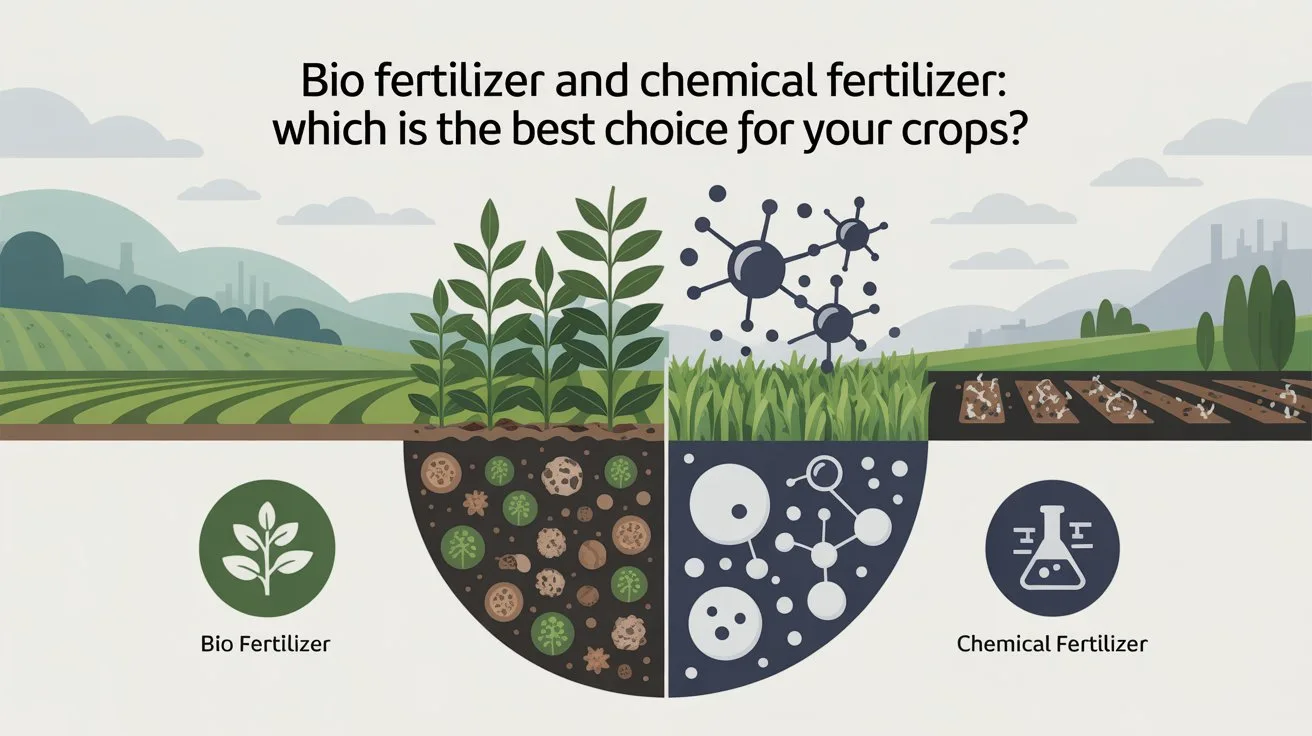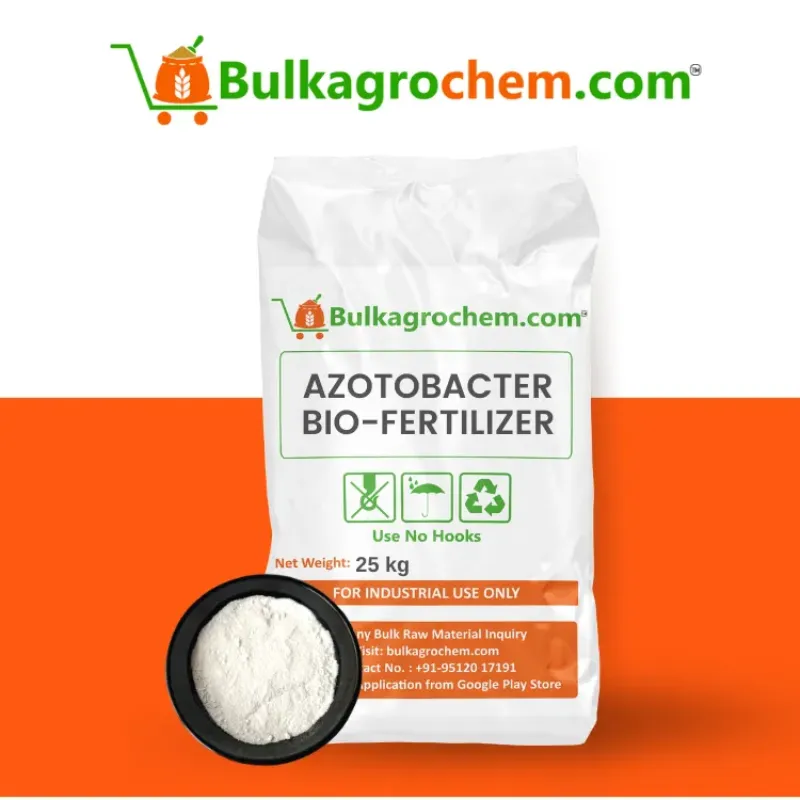When evaluating whether to use bio fertilisers or chemical fertilisers, it is vital that farmers consider the long-term consequences for crops, soil, and the environment. Bio fertilisers come from a living source (such as bacteria, fungi, and algae) and improve soil fertility by boosting soil natural processes like nitrogen fixation, and the degradation of organic matter. They improve soil structure, and create a living microbial environment that benefits sustainable farming practices. Chemical fertilisers provide fast release nutrients boosting crop growth over a short-period of time, however, they may harm the soil by depleting organic matter and beneficial microbes over the long-term.
Chemical fertilisers may help get crops to yield at inception but the risks include soil acidification, contamination of water courses, and loss of long-term soil fertility. Whereas bio fertilisers work in conjunction with nature, and come with slow, sustainable results. The continued use of bio fertilisers creates recoverability to regenerate soil health, and in turn a range of better yields from softened soil to more resilient crops. For these reasons, the decision of going with bio fertilisers vs chemical fertilisers lies with the longer agricultural goals of a farmer and the perceived results as either preferred choices, either immediate or fiscally eco-friendly sustainable farming practice focusing on soil health for future generations.
Introduction: Understanding the Basics of Bio Fertilizer and Chemical Fertilizer
Fertilizers are an essential part of the agriculture industry as they provide plants with the nutrients they need to grow. However, when it comes to using fertilizers on your crops, the decision between bio fertilizers and chemical fertilizers will affect what type of sustainable farming you want to use. Knowing the differences between these two types of fertilizers will help farmers make decisions that respect their crops while caring for the environment.
What is Bio Fertilizer?
Bio fertilizer is a natural fertilizer that contains living organisms (for example, bacteria, fungi or algae) that naturally promote soil and plant fertility. These organisms work to improve soil fertility through natural process such as nitrogen fixation, organic matter decomposition, and increased plant nutrient uptake. Bio fertilizers are usually sourced from natural organisms, as they contribute to building a healthy and sustainable ecosystem in the soil, sprouting organic farming which helps generate a chemical-free environment for the plants and soil.
What is Chemical Fertilizer?
Chemical fertilizers, on the other hand, are synthetic fertilizers made from chemical compounds, including nitrogen, phosphorus, and potassium, which are essential for plant growth. These fertilizers provide immediate access to nutrients, helping crops grow quickly. Chemical fertilizers are commonly used in conventional farming to boost crop yield, but their overuse can lead to negative consequences like soil degradation, reduced biodiversity, and water pollution.
Key Differences Between Bio and Chemical Fertilizers
Composition:
- Bio fertilizers contain living microorganisms that naturally improve soil health.
- Chemical fertilizers consist of synthetic chemical compounds that quickly supply nutrients to plants.
Impact on Soil Health:
- Bio fertilizers improve soil structure, microbial diversity, and organic matter content, fostering long-term soil health.
- Chemical fertilizers can deplete soil health over time, harming beneficial microbes and leading to soil degradation.
Environmental Impact:
- Bio fertilizers are eco-friendly and promote sustainable farming by reducing dependence on chemicals.
- Chemical fertilizers contribute to environmental pollution, including water contamination through nutrient runoff and greenhouse gas emissions.
Nutrient Release:
- Bio fertilizers release nutrients gradually, supporting long-term plant health and improving the natural nutrient cycle in the soil.
- Chemical fertilizers offer quick nutrient release, providing immediate growth but potentially causing nutrient imbalances and crop dependency.
Cost and Efficiency:
- Bio fertilizers are often cost-effective in the long run, though their initial cost may be higher. They reduce the need for frequent chemical interventions and promote soil regeneration.
- Chemical fertilizers are cheaper initially but can lead to long-term costs due to their environmental impact, reduced soil fertility, and dependence on continuous applications.
The Benefits of Bio Fertilizers in Agriculture
Bio fertilizers play a significant role in sustainable farming, offering several advantages over traditional chemical fertilizers. These natural alternatives provide essential nutrients to crops through biological processes and promote a healthier, more resilient agricultural ecosystem. Let’s explore the key benefits of bio fertilizers and how they compare to chemical fertilizers.
Sustainability and Eco-friendliness
One of the primary advantages of bio fertilizers is their contribution to sustainable farming practices. Bio fertilizers use natural processes to enhance soil fertility, which results in minimal environmental impact. They promote the growth of beneficial microorganisms in the soil, reducing the need for chemical interventions and fostering a healthy, balanced ecosystem.
Long-term Soil Health Improvement
Bio fertilizers are particularly beneficial for long-term soil health. Unlike chemical fertilizers, which may offer short-term growth benefits but degrade soil quality over time, bio fertilizers improve the overall structure and nutrient content of the soil. They enhance organic matter, promote the growth of beneficial soil organisms, and increase water retention, ensuring sustainable crop productivity for years to come.
Cost-effectiveness for Sustainable Farming
The Advantages of Chemical Fertilizers for Rapid Crop Growth
Chemical fertilizers have been a cornerstone of modern agriculture for many decades due to their ability to quickly provide essential nutrients for plant growth. While bio fertilizers offer long-term sustainability and soil health benefits, chemical fertilizers remain a key tool for rapid crop growth and increased farming efficiency. Below, we’ll delve into the specific advantages of chemical fertilizers and how they contribute to fast-growing crops and high-yielding farming systems.
Quick Nutrient Release for Immediate Plant Growth
One of the primary benefits of chemical fertilizers is their ability to provide plants with quick access to essential nutrients, such as nitrogen, phosphorus, and potassium (NPK). This rapid nutrient release can result in immediate plant growth and faster crop cycles, making chemical fertilizers an ideal choice for crops that require quick boosting during their growing seasons.
Increased Agricultural Efficiency
Chemical fertilizers significantly increase agricultural efficiency by providing a concentrated source of nutrients. This leads to higher yields in shorter periods, making chemical fertilizers a valuable option for farmers aiming for high productivity. Chemical fertilizers also help mitigate nutrient deficiencies in the soil, ensuring crops receive adequate nourishment even when the soil’s natural nutrient reserves are low.
Essential for High-Intensity Farming
In high-intensity farming, where large amounts of food need to be produced quickly, chemical fertilizers are an essential tool. Their ability to provide nutrients on demand ensures that crops can grow quickly and healthily, which is crucial in maintaining food production levels to meet the demands of growing populations. These fertilizers are particularly useful in monoculture systems where crops are grown intensively in the same soil year after year.
Environmental Impact: Bio Fertilizers vs Chemical Fertilizers
Bio Fertilizers and Sustainability
- Point: Bio fertilizers are derived from natural, renewable sources such as beneficial microorganisms, organic materials, or plant extracts.
- Explanation: These fertilizers enhance soil health by improving its structure, increasing microbial activity, and supporting biodiversity. They work in harmony with nature, promoting sustainable farming practices. Bio fertilizers also contribute to reducing environmental pollution, as they don’t leach harmful chemicals into the soil or water systems. They help in replenishing soil nutrients over time, fostering long-term soil fertility.
Chemical Fertilizers and Environmental Degradation
- Point: Chemical fertilizers, while effective in providing immediate nutrients to crops, can have long-term negative effects on the environment.
- Explanation: Overuse of chemical fertilizers leads to nutrient leaching into water bodies, contributing to water pollution, eutrophication, and the contamination of aquatic ecosystems. The excess use of nitrogen and phosphorus from chemical fertilizers can lead to greenhouse gas emissions, particularly nitrous oxide (N₂O), which is a potent greenhouse gas. Soil health also suffers as chemical fertilizers disrupt the natural microbial balance, reducing soil fertility over time.
The Future of Fertilization
- Point: The future of fertilization lies in a balanced approach between bio and chemical fertilizers, integrating their strengths for sustainable farming.
- Explanation: The environmental challenges posed by chemical fertilizers have led to a shift towards more sustainable farming practices. Research is focused on enhancing the efficiency of bio fertilizers to reduce reliance on chemical inputs. The future will see more eco-friendly innovations such as slow-release bio fertilizers, microbial inoculants, and precision agriculture technologies that optimize fertilizer application. By combining bio and chemical fertilizers in a sustainable way, farmers can achieve better crop yields while minimizing environmental damage.
FAQs
Q1. What are the main benefits of using bio fertilizers?
Bio fertilizers improve soil health by enhancing microbial activity, increase soil fertility naturally, and reduce environmental pollution. They promote sustainable farming practices, help crops resist pests and diseases, and support long-term soil productivity.
Q2. Can bio fertilizers fully replace chemical fertilizers?
In most cases, bio fertilizers can significantly reduce the need for chemical fertilizers, especially for nutrient supply. However, depending on the crop and soil needs, a combination of bio and chemical fertilizers may sometimes be necessary for optimal growth.
Q3. How do chemical fertilizers impact the environment?
Chemical fertilizers can cause soil degradation, water pollution due to nutrient runoff, and negatively affect soil biodiversity. Overuse can lead to imbalances in soil microorganisms, reduce soil health, and contribute to climate change through greenhouse gas emissions.
Q4. Are bio fertilizers more expensive than chemical fertilizers?
While bio fertilizers may have a higher initial cost, they offer long-term savings by improving soil health, reducing the need for chemical inputs, and lowering environmental cleanup costs. Over time, they can be more economical in terms of sustainability and productivity.
Q5. How can I integrate bio fertilizers into my farming practice?
Start by selecting the right bio fertilizer for your crops and soil conditions. Apply them during soil preparation or at planting using techniques like seed treatment, soil drenching, or foliar spraying. Regular monitoring and combining bio fertilizers with organic farming practices can further enhance results.
Conclusion: Making the Right Fertilizer Choice for Your Crops and Environment
Choosing the right fertilizer is crucial for the success of your crops and the long-term health of your soil. While bio fertilizers offer sustainable, eco-friendly solutions by enhancing soil health, improving nutrient availability, and supporting natural pest resistance, chemical fertilizers provide quick and effective results for short-term crop growth and are essential in high-intensity farming systems.
When deciding between bio and chemical fertilizers, it's important to consider the specific needs of your crops, the health of your soil, and your farming goals. For a more sustainable future, bio fertilizers can be an excellent choice, offering both environmental benefits and cost-effectiveness in the long run. However, in certain situations, combining bio fertilizers with chemical fertilizers can help meet immediate nutrient needs and maximize yields.
Ultimately, making an informed fertilizer choice involves weighing the environmental impact, cost, and long-term sustainability. By adopting the right mix of bio fertilizers and chemical fertilizers, you can create a balanced, productive farming system that supports both your crops and the environment.





